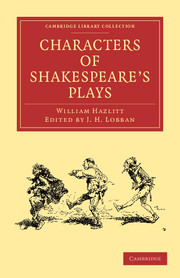Book contents
- Frontmatter
- Preface
- Contents
- Introduction
- Preface
- Cymbeline
- Macbeth
- Julius Cæsar
- Othello
- Timon of Athens
- Coriolanus
- Troilus and Cressida
- Antony and Cleopatra
- Hamlet
- The Tempest
- The Midsummer Night's Dream
- Romeo and Juliet
- Lear
- Richard II
- Henry IV
- Henry V
- Henry VI
- Richard III
- Henry VIII
- King John
- Twelfth Night; or, what you will
- The Two Gentlemen of Verona
- The Merchant of Venice
- The Winter's Tale
- All's Well That Ends Well
- Love's Labour's Lost
- Much Ado About Nothing
- As You Like It
- The Taming of the Shrew
- Measure for Measure
- The Merry Wives of Windsor
- The Comedy of Errors
- Doubtful plays of Shakespear
- Poems and Sonnets
- Notes
Richard III
Published online by Cambridge University Press: 07 September 2010
- Frontmatter
- Preface
- Contents
- Introduction
- Preface
- Cymbeline
- Macbeth
- Julius Cæsar
- Othello
- Timon of Athens
- Coriolanus
- Troilus and Cressida
- Antony and Cleopatra
- Hamlet
- The Tempest
- The Midsummer Night's Dream
- Romeo and Juliet
- Lear
- Richard II
- Henry IV
- Henry V
- Henry VI
- Richard III
- Henry VIII
- King John
- Twelfth Night; or, what you will
- The Two Gentlemen of Verona
- The Merchant of Venice
- The Winter's Tale
- All's Well That Ends Well
- Love's Labour's Lost
- Much Ado About Nothing
- As You Like It
- The Taming of the Shrew
- Measure for Measure
- The Merry Wives of Windsor
- The Comedy of Errors
- Doubtful plays of Shakespear
- Poems and Sonnets
- Notes
Summary
Richakd III. may be considered as properly a stageplay: it belongs to the theatre, rather than to the closet. We shall therefore criticise it chiefly with a reference to the manner in which we have seen it performed. It is the character in which Garrick came out: it was the second character in which Mr Kean appeared, and in which he acquired his fame. Shakespear we have always with us: actors we have only for a few seasons; and therefore some account of them may be acceptable, if not to our cotemporaries, to those who come after us, if “that rich and idle personage, Posterity,” should deign to look into our writings.
It is possible to form a higher conception of the character of Richard than that given by Mr Kean: but we cannot imagine any character represented with greater distinctness and precision, more perfectly articulated in every part. Perhaps indeed there is too much of what is technically called execution. When we first saw this celebrated actor in the part, we thought he sometimes failed from an exuberance of manner, and dissipated the impression of the general character by the variety of his resources. To be complete, his delineation of it should have more solidity, depth, sustained and impassioned feeling, with somewhat less brilliancy, with fewer glancing lights, pointed transitions, and pantomimic evolutions.
- Type
- Chapter
- Information
- Characters of Shakespeare's Plays , pp. 171 - 178Publisher: Cambridge University PressPrint publication year: 2009First published in: 1908

